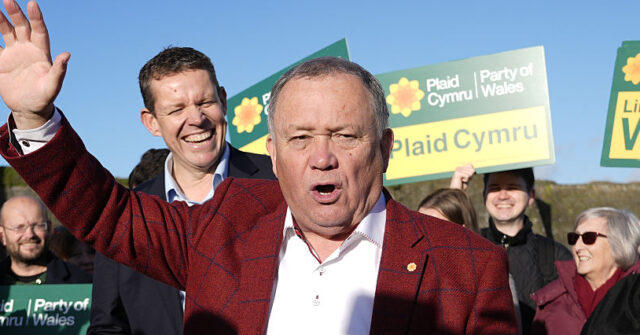The ruling Labour Party crashed from 46 to 11 per cent in a key special election, losing a ballot in a left-wing heartland town for the first time in a century as outsider insurgents took over 80 per cent of the vote.
Left and right wing populists dominated the election, taking over 80 per cent of the votes between them, squeezing out the legacy parties and all other contenders, a possible glimpse in the future of British politics.
Hard-left Welsh nationalist separatists Plaid Cymru (‘Party of Wales’) won a thumping 47 per cent of the vote in a hotly contested by-election in Caerphilly overnight. While such special elections for the devolved Welsh regional parliament are not often so closely watched, the race had come to be seen as a key barometer for public sentiment, and something of a referendum on the legacy Labour Party which has held the area reliably for all of living memory.
Confirming broader national polling, as well as the state of politics in the non-English UK home nations where separatist parties have become serious contenders, the legacy Westminster parties weren’t even in with a hope. Labour collapsed, losing three-quarters of its vote over the last Welsh Assembly election in 2021. Even just last year for the Westminster elections, it managed to grab 38 per cent.
The Conservatives — never strong in this part of Wales but the dominant political force in British politics for centuries otherwise — may wonder why they even bothered. In a constituency with an electorate of over 66,000 voters, this faded titan managed to scrape just 690 votes.
So the race was down to Plaid and Nigel Farage’s Reform UK. While coming second place in a winner-takes-all system won’t be much help to Farage and his aspirations to lead the nation, the party can take massive comfort that they increased their vote from less than two per cent in 2021 to 36 per cent today, a respectable second-place.
Evidently, tactical voting was a massive factor in the result, with ballots allegedly placed in many cases to confound Plaid or Reform, rather than for positive reasons of support. Spectator deputy editor James Heale noted in a dispatch that otherwise unthinkable tactical moves like Labour supporters voting for Nigel Farage’s Reform — their sworn enemy — in a bid to defeat Plaid, whose political ambitions include breaking up the United Kingdom.
Politico reported it was a conscious strategic move by Plaid to encourage tactical voting, portraying themselves as the only answer in this special election to slow Nigel Farage’s march towards Downing Street.
While non-Westminster elections — such as for the regional devolved parliaments, or for the European Parliament back in their day — have always tended to favour more diverse politics, with voters previously tending to return to the legacy parties for the national vote, the Caerphilly election does confirm the broad trend of polling nationwide.
Further, Reform’s political support is broader and nationwide, giving it a reasonable chance at ruling the country in the coming years. Plaid is a localist concern, and can’t hope to repeat such victories on a larger scale.
As reported, Labour under Sir Keir Starmer has suffered a major collapse in support analogous to that seen by the Conservative Party after their failures on border control this past decade. Sir Keir is the least popular UK Prime Minister in the history of polling, it was stated in September, and this news came the same week a poll found a majority of Britons want him to resign.
Read the full article here


